Keto Diet for Immune System
-
-
- Fats
- Dairy
- Proteins
- Carbohydrates
- Drinks
- Condiments, Spices, Dressings
- Sweeteners
- Supplements
- Plant-Based Options
-
The ketogenic diet might seem restrictive but there are hundreds of food variations you can eat once you're low-carb. All your favorite flavors — from Indian food to Mexican, savory to sweet — are on the approved keto food list.
GET MORE KETO-FRIENDLY RECOMMENDATIONS
Subscribe to the Perfect Keto weekly newsletter to get easy & insanely delicious keto recipes, keto guides & the latest keto trends right in your inbox.
You're in!
The first few weeks on keto might be a little rough, but once you're fat-adapted, those cravings will subside and you'll have plenty of go-to keto meals on your roster.
How to Use This Keto Food List
Use this list so you can easily refer back to it when you're first starting keto. Remember: try to eat real food and avoid processed food.
How to Shop for Healthy Keto Foods
- Buy food that was once alive. Foods like fresh pastured meat, wild-caught seafood, organic, low-carb vegetables, and nuts.
- Stick to the outside ring of the grocery store. The perimeter of the store usually has the fresh, unpackaged foods like meat and vegetables. Avoid those middle shelves to avoid more processed, packaged foods.
- Look for ingredients you recognize. If you do opt for packaged foods, read the labels. And if you don't recognize more than 2-3 ingredients, put it back on the shelf.
Check both the nutrition label and ingredients to make sure there aren't any sneaky carbs, sugars, or fake ingredients that may mess up your hard work and compromise your health.

Fats
When it comes to the keto food list, healthy fats form the cornerstone of the diet. To keep your body in a state of ketosis — breaking down fat instead of carbs for fuel — you have to eat enough fat.
But the quality of your dietary fat matters. There are four categories of fat allowed on the keto diet:
- Saturated fats
- Monounsaturated fats (MUFAs)
- Polyunsaturated fats (PUFAs), which includes omega-3s
Keep in mind that you want a good balance of omega-3s and omega-6s to support overall health, including proper nerve and brain function, and reduce the risk for heart disease, Alzheimer's disease, and Type 2 diabetes.
Too much omega-6 fatty acids can be inflammatory, so avoid sources of high omega-6s, such as grains and vegetable oils like corn oil or sunflower oil. Focus mostly on omega-3s from fish like trout, salmon, and sardines or take a high-quality fish oil supplement like krill oil. Also, be mindful of nuts and seeds because they do contain some carbs, especially pistachios and almonds.
Fats and Oils
The quality of your dietary fat on keto makes a huge difference in the results you'll see. It's essential to learn which sources of fat are really considered healthy and safe to eat on keto. We covered this in great detail in this guide.
Saturated fat has been shown to improve HDL and LDL cholesterol levels — both the good and bad cholesterol markers — and it can also fortify bone density and support your immune system and hormones.
Saturated fats include:
Take the keto quiz
Find the right keto snacks & supplements
for your unique goals
Take quiz
- Pasture-raised and organic meats
- High-fat dairy like ghee, butter, and heavy cream
- Lard, tallow, and eggs
- MCT oil and coconut oil
When you whip up a few keto recipes, you'll probably be cooking with one of the items listed above. These fats are solid at room temperature while monounsaturated and polyunsaturated fatty acids remain a liquid at room temperature. Monounsaturated fats have been shown to improve insulin resistance and cholesterol, as well as reduce abdominal fat and your risk for heart disease[*].
The best sources of monounsaturated fats include:
- Extra virgin olive oil, avocado oil, and macadamia nut oil
- Nuts and seeds
Polyunsaturated fats are also found in similar sources like:
- Nuts and seeds such as walnuts, flaxseeds, chia seeds, sunflower, and pumpkin seeds
- Flax oil, sesame oil, fish oil, and krill oil
- Fatty fish like trout, mackerel, salmon, and tuna
Check out the chart for a visual of the healthy fats and oils on the keto food list:
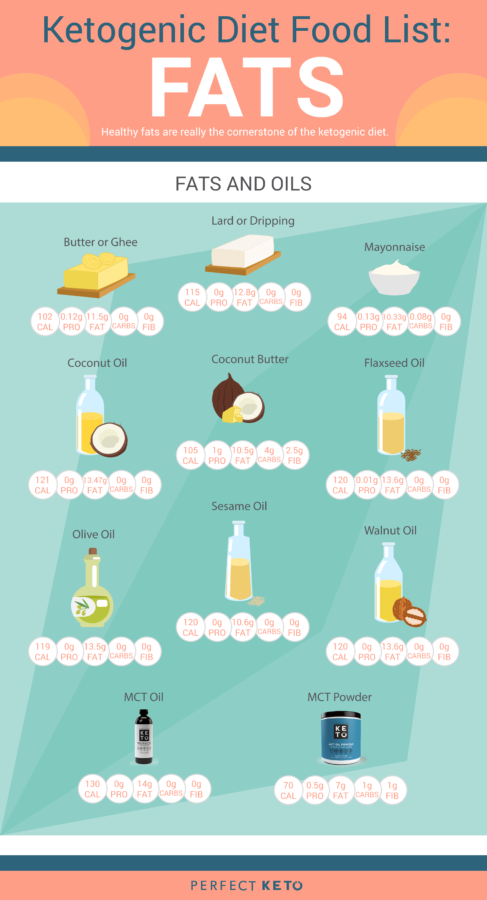
| Food | Serving Size | Calories | Protein | Fat | Total Carb | Fiber | Net Carb |
|---|---|---|---|---|---|---|---|
| Butter or ghee | 1 tablespoon (14.2g) | 102 | 0.12g | 11.5g | 0g | 0g | 0g |
| Lard/Dripping | 1 tablespoon (12.8g) | 115 | 0g | 12.8g | 0g | 0g | 0g |
| Mayonnaise | 1 tablespoon (13.8g) | 94 | 0.13g | 10.33g | 0.08g | 0g | 0.08g |
| Coconut Oil | 1 tablespoon (13.6g) | 121 | 0g | 13.47g | 0g | 0g | 0g |
| Coconut butter | 1 tablespoon (16g) | 105 | 1g | 10.5g | 4g | 2.5g | 1.5g |
| Flaxseed oil | 1 tablespoon (13.6g) | 120 | 0.01g | 13.6g | 0g | 0g | 0g |
| Olive oil | 1 tablespoon (13.5g) | 119 | 0g | 13.5g | 0g | 0g | 0g |
| Sesame seed oil | 1 tablespoon (13.6g) | 120 | 0g | 13.6g | 0g | 0g | 0g |
| MCT oil | 1 tablespoon/15 mL | 130 | 0g | 14g | 0g | 0g | 0g |
| MCT powder | 1 scoop (10g) | 70 | 0.5g | 7g | 1g | 1g | 0g |
| Walnut oil | 1 tablespoon (13.6g) | 120 | 0g | 13.6 | 0g | 0g | 0g |
Fats and Oils to Avoid
Just because you're following a ketogenic diet doesn't mean you should indulge in every fat you come across. All fats are not created equal.
Steer clear of these unhealthy fats:
#1: Hydrogenated and partially hydrogenated oils. These fats are found in packaged foods. They increase inflammation and your risk of developing heart disease, cancer, and high cholesterol.
If you're relying on packaged foods to get you through keto, check the label and ditch any foods with these.
#2: Highly processed vegetable oils. Corn oil, peanut oil, canola oil, soybean oil, sunflower, and grapeseed oil are all fats that sound healthier than they actually are. These veggie oils are detrimental to your health and could be to blame for your keto plateau, because they:
- Are usually made with genetically modified seeds that are potential allergens.
- Are cooked well above their smoke point, which makes the oils go rancid. This puts you at risk of developing certain cancers, obesity, and depression.
- Leave fatty deposits in your body which can lead to heart attacks and premature death.
- Contain higher amounts of omega-6 fatty acids and contribute to chronic inflammation in your body.
These oils should be removed entirely from your diet, not just eaten in moderation. To learn more about why that is, listen to this podcast episode or check out this guide.
Nuts and Seeds
Another easy and satisfying way to sneak more healthy fats into your diet is to reach for raw nuts and seeds. As mentioned in this guide, these nutritional powerhouses are loaded with essential nutrients like magnesium, selenium, and manganese. Nuts and seeds can improve your brain health, fortify your immune system, and aid with digestion and blood glucose management.
They're also high in healthy fats, have a moderate amount of protein, and are generally low in carbohydrates, depending on the type you choose. Nuts are also portable, making them one of the best keto-friendly snacks. However, before you run out and stock up enough nuts to last you through winter, you should know that some nuts are better for you than others.
In the context of a keto diet, this means they have more fat and fewer carbs.
These are the top keto nuts and seeds to include on your keto food list:
- Macadamia nuts, pecans
- Brazil nuts, walnuts, hazelnuts
- Pine nuts, almonds, cashews
- Nut butters
- Pumpkin seeds, sesame seeds, and tahini (sesame seed paste)
- Sunflower seeds and sunflower seed butter
- Chia seeds and flaxseeds
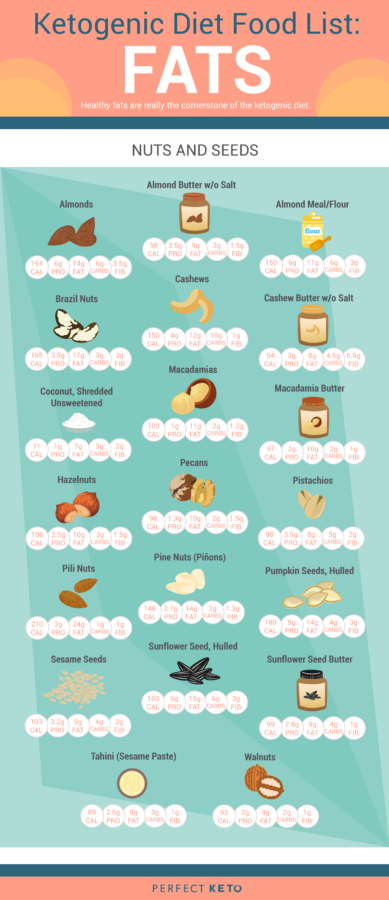
| Food | Serving Size | Calories | Protein | Fat | Total Carb | Fiber | Net Carb |
|---|---|---|---|---|---|---|---|
| Almonds | 23 nuts (28g) | 164 | 6g | 14g | 6g | 3.5g | 2.5 |
| Almond butter (w/o salt) | 1 tablespoon (16g) | 98 | 3.5g | 9g | 3g | 1.5 | 1.5 |
| Almond meal/flour | 1/4 cup (25g) | 150 | 6g | 11g | 6g | 3g | 3g |
| Brazil nuts | 5 nuts (25g) | 165 | 3.5g | 17g | 3g | 2g | 1g |
| Cashews | 1/4 cup (28g) | 150 | 4g | 12g | 10g | 1g | 9g |
| Cashew butter (w/o salt) | 1 tablespoon (16g) | 94 | 3g | 8g | 4.5g | 0.5g | 4g |
| Coconut (shredded unsweetened) | 1/4 cup (20g) | 71 | 1g | 7g | 3g | 2g | 1g |
| Macadamias | 6 kernels (14g) | 102 | 1g | 11g | 2g | .2g | 0.8g |
| Macadamia butter | 1 tablespoon (14g) | 97 | 2g | 10g | 2g | 1g | 1g |
| Hazelnuts | 12 nuts (17g) | 106 | 2.5g | 10g | 3g | 1.5g | 1.5g |
| Pecans | 10 halves (14g) | 98 | 1.3g | 10g | 2g | 1.5g | 0.5g |
| Pili nuts | 1/4 cup (30g) | 210 | 3g | 24g | 1g | 1g | 0g |
| Pine nuts | 2 tablespoons (20g) | 148 | 2.7g | 14g | 2g | 1.3g | 0.7g |
| Pistachios | 25 nuts (17.5g) | 98 | 3.5g | 8g | 5g | 2g | 3g |
| Pumpkin seeds (hulled) | 1/4 cup (30g) | 180 | 9g | 14g | 4g | 3g | 1g |
| Sesame seeds | 2 tablespoons (18g) | 103 | 3.2g | 9g | 4g | 2g | 2g |
| Sunflower seeds (hulled) | 1/4 cup (30g) | 160 | 6g | 15g | 6g | 3g | 3g |
| Sunflower seed butter | 1 tablespoon (16g) | 99 | 2.8g | 9g | 4g | 1g | 3g |
| Tahini (sesame paste) | 1 tablespoon (15g) | 89 | 2.6g | 8g | 3g | 1g | 2g |
| Walnuts | 7 halves (14g) | 93 | 2g | 9g | 2g | 1g | 1g |
Nuts and Seeds to Avoid
Wondering why peanuts and peanut butter didn't make the approved keto food list? Many people don't realize peanut butter is not actually made with nuts. Peanuts are technically a legume, which is in the same family as peas, soybeans, and lentils.
While the macro breakdown and monounsaturated fat amount of a serving of peanuts may be similar to other nuts, that's where their healthy comparison stops.
Most peanut butters are:
- Packed with unnecessary sugars
- Loaded with hydrogenated oils (harmful fats)
- Low in fat and filled with junk as a replacement
- Hard to digest
- Covered in pesticides
- High in oxalates (which prevent proper nutrient absorption and can lead to kidney stones)
- High in inflammatory omega-6 fatty acids
Rather than getting a dose of fat from this unhealthy nut imposter, try one of these nut butters instead.
For more information on acceptable fats, check out Good Fats vs Bad Fats on the Ketogenic Diet

Keto Diet Foods: Dairy
Most dairy products get the green light on the keto food list, as they typically contain high doses of fat and protein with very few carbs. Just opt for the full-fat version and organic and raw, if possible.
If you don't have any issues digesting dairy, try these keto-friendly options:
- Unflavored Greek yogurt, fermented yogurt, and kefir
- Heavy cream and heavy whipping cream
- Hard cheeses like blue cheese, gouda, cheddar, and parmesan
- Semi-hard cheese such as colby, provolone, and Swiss cheese
- Softer cheeses like mozzarella, brie, muenster, and Monterey Jack
- Cream cheese, sour cream, mascarpone, creme fraiche, and cottage cheese, which are also fine on a high-fat diet
But for some people, dairy causes stomach bloating and abdominal pain, a condition referred to as lactose intolerance. Lactose intolerance comes from the sugar found in milk. If you are sensitive to dairy products, try following these tips:
- Find hard and long-aged dairy
- Use ghee, a butter alternative without the irritating milk solids
- Get checked for a casein sensitivity to rule out the other common irritant found in dairy
- If you really can't tolerate dairy, try a non-dairy alternative like unsweetened almond milk or coconut milk
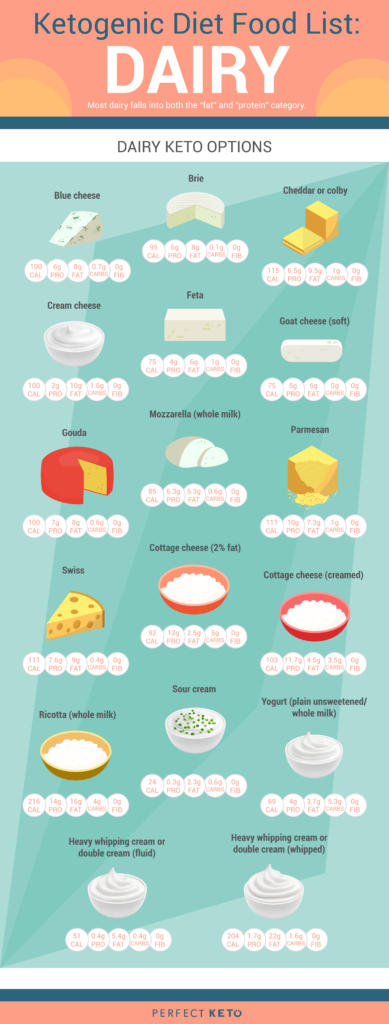
| Food | Serving Size | Calories | Protein | Fat | Total Carb | Fiber | Net Carb |
|---|---|---|---|---|---|---|---|
| Blue cheese | 1 oz. (28g) | 100 | 6g | 8g | 0.7g | 0g | 0.7g |
| Brie | 1 oz. (28g) | 95 | 6g | 8g | 0.1g | 0g | 0.1g |
| Cheddar or colby | 1 oz. (28g) | 115 | 6.5g | 9.5g | 1g | 0g | 1g |
| Cream cheese | 2 tablespoons (29g) | 100 | 2g | 10g | 1.6g | 0g | 0.6g |
| Feta | 1 oz. (28g) | 75 | 4g | 6g | 1g | 0g | 1g |
| Goat cheese (soft) | 1 oz. (28g) | 75 | 5g | 6g | 0g | 0g | 0g |
| Gouda | 1 oz. (28g) | 100 | 7g | 8g | 0.6g | 0g | 0.6g |
| Mozzarella (whole milk) | 1 oz. (28g) | 85 | 6.3g | 6.3g | 0.6g | 0g | 0.6g |
| Parmesan | 1 oz. (28g) | 111 | 10g | 7.3g | 1g | 0g | 1g |
| Swiss | 1 oz. (28g) | 111 | 7.6g | 9g | 0.4g | 0g | 0.4g |
| Cottage cheese (2% fat) | 1/2 cup (113g) | 92 | 12g | 2.5g | 5g | 0g | 5g |
| Cottage cheese (creamed) | 1/2 cup (105g) | 103 | 11.7g | 4.5g | 3.5g | 0g | 3.5g |
| Ricotta (whole milk) | 1/2 cup (124g | 216 | 14g | 16g | 4g | 0g | 4g |
| Sour cream | 1 tablespoon (12g) | 24 | 0.3g | 2.3g | 0.6g | 0g | 0.6g |
| Yogurt (plain unsweetened/whole milk) | 4 oz. (113g) | 69 | 4g | 3.7g | 5.3 | 0g | 5.3 |
| Heavy whipping cream or double cream (fluid) | 1 tablespoon (15g) | 51 | 0.4g | 5.4g | 0.4g | 0g | 0.4g |
| Heavy whipping cream or double cream (whipped) | 1/2 cup (60g) | 204 | 1.7g | 22g | 1.6g | 0g | 1.6g |
Dairy to Avoid
A few dairy products should be avoided due to their high sugar and carb content. For example, a glass of whole milk (which doesn't have any fat removed) contains 12.8g of carbs per glass. Other dairy you should avoid include:
- Low-fat, reduced fat, and fat free milk
- Half and half
- Evaporated and condensed milk
To learn more about acceptable dairy options, check out this in-depth guide: The Secret to Keto Dairy (And How Keto Can Help Lactose Intolerance)

Keto Diet Foods: Proteins
Protein is a vital component of any diet. Protein fuels your body with essential amino acids, helps regulate organs, and builds muscle and connective tissue.
Ideally, you should consume 0.8 grams of protein per pound of lean body mass (at least). This will prevent muscle loss and help you build essential neurotransmitters and hormones. Some people consume up to 20% of total calories from protein and stay in ketosis.
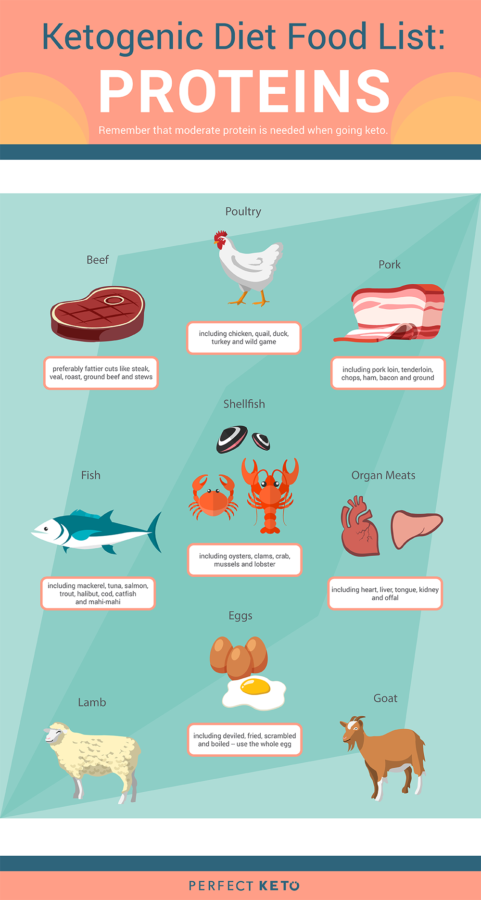
As with fats, make sure these calories come from healthy sources:
- Choose the highest-quality meat and eggs you can afford
- Pick grass-fed, organic, and pasture-raised options whenever possible
- Look for wild-caught seafood sources
- When it comes to cut, select a fattier cut whenever possible
Here are the best proteins to eat on keto:
- Beef, preferably fattier cuts like steak, veal, roast, and ground beef
- Poultry, including chicken, quail, duck, turkey and wild game — try to focus on the darker, fattier meats
- Pork, including pork loin, tenderloin, chops, ham, bacon, and ground
- Fish, including mackerel, tuna, salmon, sardines, trout, halibut, cod, catfish, and mahi-mahi
- Shellfish, including oysters, clams, crab, mussels, and lobster
- Organ meats, including heart, liver, tongue, kidney, and offal
- Eggs, including deviled, fried, scrambled, and boiled — use the whole egg
- Lamb meat
- Goat meat
To learn more about the benefits of eating grass-fed meat, check out this guide .
Proteins to Avoid
To really excel at keto, it's not just about adding more fat to your diet; it's also about removing the junk. Many meats contain additives, artificial ingredients, and unnecessary sugars so you'll need to eliminate those to improve your health. They include processed and cured meats like pepperoni, salami, hot dogs, and certain jerky.
For more information about protein on keto, check out Is Too Much Protein Bad for Ketosis?

Keto Diet Foods: Carbohydrates
When following keto, you want to get the majority of your carbohydrates from vegetables such as leafy greens (which contain almost no carbs), asparagus, and broccoli, and most other vegetables that grow above ground. Avoid starchy vegetables like potatoes, corn, and parsnips.
The rest of your carbohydrate intake should come from the carbs in nuts and seeds, the small amount in dairy and on occasion, from fruits like berries.

Raw Vegetables
Most vegetables, including leafy greens and cruciferous vegetables, are encouraged on keto. The best options include eating vegetables that grow above the ground, such as:
- Spinach
- Bell peppers
- Lettuce
- Collard greens
- Arugula
- Zucchini
- Cauliflower
- Green and white cabbage
- Cucumbers
- Brussels sprouts
- Eggplant
- Radishes
- Okra
- Celery
- Asparagus
| Food | Serving Size | Calories | Protein | Fat | Total Carb | Fiber | Net Carb |
|---|---|---|---|---|---|---|---|
| Alfalfa sprouts | 1/2 cup (43g) | 15 | 1.5g | 0g | 2g | 1g | 1g |
| Artichoke hearts, marinated | 4 pieces (64g) | 60 | 0g | 6g | 4g | 2g | 2g |
| Artichoke hearts, canned | 1 heart (16g) | 15 | 0g | 1.5g | 1g | 0.5g | 0.5g |
| Arugula | 1 cup (20g) | 5 | 0.5g | 0g | 0.5g | 0g | 0.5g |
| Beans, green, snap, string, wax | 1/2 cup (50g) | 16 | 1g | 0g | 3.5g | 1.5g | 2g |
| Bok choy (pak choi) | 1 cup (70g) | 9 | 1g | 0g | 1.5g | 1g | 0.5g |
| Boston/bibb lettuce | 1 cup (55g) | 7 | 1g | 0g | 1g | 1g | 0g |
| Broccoli florets | 1/2 cup (36g) | 10 | 1g | 0g | 2g | 1g | 1g |
| Cabbage, green, red, savoy | 1/2 cup (60g | 8 | 0.4 | 0g | 2g | .9g | 1.1g |
| Cauliflower florets | 1/2 cup (54g) | 13 | 1g | 0g | 3g | 1g | 2g |
| Celery | 1 stalk (40g) | 6 | 0g | 0g | 1g | 0.5g | 0.5g |
| Chicory greens | 1/2 | 3 | 0g | 0g | 1g | 0.5g | 0.5g |
| Chinese cabbage (pak-choi) | 1/2 cup, shredded (35g) | 5 | 0.5g | 0g | 1g | 0.5g | 0.5g |
| Chives | 1 tablespoon (3g) | 1 | 0.1g | 0g | 0.1g | 0.1g | 0g |
| Cucumber (with peel) | 1/2 cup, sliced (52g) | 8 | 0.3g | 0g | 2g | 0.3g | 1.7g |
| Daikon radish | 1/2 cup (58g) | 9 | 0.4g | 0g | 2g | 1g | 1g |
| Endive | 1/2 cup (25g) | 4 | 0.3g | 0g | 1g | 1g | 0g |
| Escarole | 1/2 cup (75g) | 14 | 1g | 0g | 2.3g | 2g | 0.3g |
| Fennel, bulb | 1/2 cup (44g) | 13 | 0.5g | 0g | 3g | 1g | 2g |
| Greens, mixed | 1 cup (36g) | 5 | 0.5g | 0g | 1g | 0.5g | 0.5g |
| Iceberg lettuce | 1 cup (72g) | 10 | 0.7g | 0g | 2g | 1g | 1g |
| Jicama | 1/2 cup (60g) | 23 | 0.5g | 0g | 5g | 3g | 2g |
| Loose-leaf lettuce | 1 cup (57g) | 8 | 0.5g | 0g | 3g | 1g | 2g |
| Mung bean sprouts | 1/2 cup (52g) | 16 | 1.5g | 0g | 3g | 1g | 2g |
| Mushrooms, button, fresh | 1/2 cup (35g) | 8 | 1g | 0g | 1g | 0.3g | 0.7g |
| Olives, black | 5 (19g) | 30 | 0g | 3g | 1g | 0g | 1g |
| Olives, green | 5 (14g) | 20 | 0g | 2g | 0.5g | 0.4g | 0.1g |
| Onion | 2 tablespoons, chopped (20g) | 8 | 0.2g | 0g | 2g | 0.5g | 1.5g |
| Parsley | 1 tablespoon (4g) | 1 | 0.1g | 0g | 0.2g | 0.1g | 0.1g |
| Peppers, green bell | 1/2 cup (75g) | 15 | 1g | 0g | 3.5g | 1.5g | 2g |
| Peppers, red bell | 1/2 cup (75g) | 23 | 1g | 0g | 4.5g | 1.5g | 3g |
| Radicchio | 1/2 cup (20g) | 5 | 0.3g | 0g | 1g | 0.2g | 0.8g |
| Radishes | 6 (12g) | 2 | 0g | 0g | 0.4g | 0.2g | 0.2g |
| Romaine lettuce | 1 cup (47g) | 8 | 0.5g | 0g | 1.5g | 1g | 0.5g |
| Scallion/green onion | 1/4 cup (25g) | 8 | 0.5g | 0g | 2g | 1g | 1g |
| Spinach | 1 cup (30g) | 7 | 1g | 0g | 1g | 0.7g | 0.3g |
| Tomato | 1 small (90g) | 16 | 1g | 0g | 3.5g | 1g | 2.5g |
| Tomato | 1 medium (123g) | 22 | 1g | 0.25g | 5g | 1.5g | 3.5g |
| Tomato, cherry | 5 (85g) | 15 | 1g | 0.2g | 3.3g | 1g | 2.3g |
| Watercress | 1/2 cup (17g) | 2 | 0.4g | 0g | 0.2g | 0.1g | 0.1g |
Cooked Vegetables
Cooking your vegetables helps break down the plant matter so their nutrients are easier for your body to absorb and use. You'll be able to readily use them without forcing your digestion to do all the heavy lifting[*]. This makes certain vegetables easier to digest than in their raw form.
Cooking also gives you the chance to add fat and flavor. A little oil, plus some pink Himalayan salt and pepper, can radically transform a tasteless raw vegetable into something more crave-worthy. In the end, it's smart to enjoy vegetables both ways.
During the summer, you may want a nice cold salad with spinach, while in the winter sauteed spinach with garlic may sound better.
Check out the Best Vegetables to Eat on a Keto Diet for more information when it comes to eating your veggies.
| Food | Serving Size | Calories | Protein | Fat | Total Carb | Fiber | Net Carb |
|---|---|---|---|---|---|---|---|
| Artichoke | 1/2 medium (60g) | 32 | 1.7g | 0g | 7g | 3.5g | 3.5g |
| Asparagus | 6 spears (90g) | 20 | 2g | 0g | 4g | 2g | 2g |
| Bamboo shoots, canned, sliced | 1/2 cup (66g) | 12 | 1g | 0g | 2g | 1g | 1g |
| Beans, green, wax, string, snap | 1/2 cup (63g) | 22 | 1g | 0g | 5g | 2g | 3g |
| Beet greens | 1/2 cup (72g | 19 | 2g | 0g | 4g | 2g | 2g |
| Bok choy (pak choi) | 1/2 cup (85g) | 10 | 1.3g | 0g | 1.5g | 1g | 0.5g |
| Broccoflower | 1/2 cup (34g) | 10 | 1g | 0g | 2g | 1g | 1g |
| Broccoli | 1/2 cup (78g) | 27 | 2g | 0g | 5.5g | 2.5g | 3g |
| Broccoli rabe | 1/2 cup (85g) | 28 | 3.3g | 0.5g | 2.7g | 2.4g | 0.3g |
| Brussels sprouts | 1/4 cup (40g) | 14 | 1g | 0g | 3g | 1g | 2g |
| Cabbage, green | 1/2 cup (75g) | 17 | 1g | 0g | 4g | 1.5g | 2.5g |
| Cabbage, red | 1/2 cup (75g) | 22 | 1g | 0g | 5g | 2g | 3g |
| Cabbage, savoy | 1/2 cup (73g) | 17 | 1.3g | 0g | 4g | 2g | 2g |
| Cardoon | 1/2 cup (80g) | 18 | 0.5g | 0g | 4g | 1.5g | 2.5g |
| Cauliflower | 1/2 cup (62g) | 14 | 1g | 0.3g | 2.5g | 1.5g | 1g |
| Celery | 1/2 cup (75g) | 14 | 0.5g | 0g | 3g | 1.2g | 1.8g |
| Chard, swiss | 1/2 cup (88g) | 18 | 2g | 0g | 3.5g | 2g | 1.5g |
| Chayote | 1/2 cup (80g) | 19 | 0.5g | 0.4g | 4g | 2g | 2g |
| Collard greens | 1/2 cup (95g) | 31 | 2.5g | 1g | 5.5g | 4g | 1.5g |
| Dandelion greens | 1/2 cup (53g) | 17 | 1g | 0.3g | 3.5g | 1.5g | 2g |
| Eggplant | 1/2 cup (50g) | 17 | 1g | 0g | 4g | 1g | 3g |
| Escarole | 1/2 cup (75g) | 14 | 1g | 0g | 2.3g | 2.1g | 0.1g |
| Fennel, bulb | 1/2 cup (44g) | 13 | 0.5g | 0g | 3g | 1.5g | 1.5g |
| Hearts of palm | 1 heart (33g) | 9 | 1g | 0.2g | 1.5g | 1g | 0.5g |
| Kale | 1/2 cup (65g) | 18 | 1g | 0g | 4g | 1.5g | 2.5g |
| Kohlrabi | 1/4 cup (41g) | 12 | 1g | 0g | 3g | 0.5g | 2.5g |
| Leeks | 1/2 cup (52g) | 16 | 0.5g | 0g | 4g | 0.5g | 3.5g |
| Mushrooms, button | 1/4 cup (39g) | 11 | 1g | 0g | 2g | 1g | 1g |
| Mushrooms, shiitake | 1/4 cup (36g) | 20 | 0.5g | 0g | 5g | 1g | 4g |
| Mustard greens | 1/2 cup (70g) | 18 | 2g | 0.3g | 3g | 1.5g | 1.5g |
| Nopales (cactus pads) | 1/2 cup (75g) | 11 | 1g | 0g | 2.5g | 1.5g | 1g |
| Okra | 1/2 cup (80g) | 18 | 1.5g | 0g | 3.5g | 2g | 1.5g |
| Onion, yellow; sauteed | 1/4 cup (22g) | 29 | 0g | 2.5g | 2g | 0.5g | 1.5g |
| Peppers, green bell; chopped | 1/4 cup (29g) | 37 | 0g | 3.5g | 1g | 0.5g | 0.5g |
| Peppers, red bell; chopped | 1/4 cup (27g) | 35 | 0.3g | 3.5g | 2g | 0.5g | 1.5g |
| Pumpkin | 1/4 cup (61g) | 12 | 0.5g | 0g | 3g | 1g | 2g |
| Sauerkraut | 1/2 cup; drained (71g) | 13 | 0.7g | 0g | 3g | 2g | 1g |
| Shallots | 2 tablespoons (20g) | 14 | 0.5g | 0g | 3.5g | 0.5g | 3g |
| Spaghetti squash | 1/2 cup (78g) | 21 | 0.5g | 0g | 5g | 1g | 4g |
| Spinach | 1/2 cup (90g) | 21 | 3g | 0g | 3g | 2g | 1g |
| Summer squash | 1/2 cup (90g) | 21 | 1g | 0.4g | 3.5g | 1g | 2.5g |
| Tomato | 1/4 cup (60g) | 11 | 0.5g | 0g | 2.5g | 0.5g | 2g |
| Turnips (white), mashed | 1/2 cup (115g) | 25 | 1g | 0g | 6g | 2.5g | 3.5g |
| Zucchini | 1/2 cup (90g) | 14 | 1g | 0.3g | 2.5g | 1g | 1.5g |
Fruit
Many new keto dieters are surprised to learn that fruits and fruit juices contain as many grams of carbs and sugar as some desserts. Bananas and apples, two of the most popular fruits in the United States, contain 24g and 20g of net carbs, respectively. That's your entire carb count for the day in just one fruit!
Fruit should be eaten in small amounts. When you do eat fruits, choose lower-sugar options like these and keep your portions in check:
- Berries like strawberries, raspberries, blueberries, cranberries, and blackberries
- Certain melons
- Cherries
- Avocados
| Food | Serving Size | Calories | Protein | Fat | Total Carb | Fiber | Net Carb |
|---|---|---|---|---|---|---|---|
| Avocado, Hass (Florida) | 1/2 fruit (152g) | 182 | 3.5g | 15g | 12g | 8.5g | 3.5g |
| Blackberries, fresh | 1/4 cup (36g) | 15 | 0.5g | 0.2g | 3.5g | 2g | 4g |
| Blackberries, frozen | 1/4 cup (38g) | 24 | 0.5g | 0.2g | 6g | 2g | 4g |
| Blueberries, frozen | 1/4 cup (39g) | 20 | 0.2g | 0.3g | 5g | 1g | 4g |
| Cherries, sour, fresh, w/o pit | 1/4 cup (39g) | 19 | 0.4g | 0.1g | 5g | 1g | 4g |
| Cherries, sweet, fresh, w/o pit | 1/4 cup (39g) | 24 | 0.4g | 0.1g | 6g | 1g | 5g |
| Cranberries, raw, chopped | 1/4 cup (28g) | 13 | 0.1g | 0g | 3g | 1g | 2g |
| Currants, fresh, red and white | 1/4 cup (28g) | 16 | 0.4g | 0.1g | 4g | 1g | 3g |
| Gooseberries, raw | 1/4 cup (38g) | 16 | 0.3g | 0.2g | 4g | 1.5g | 2.5g |
| Loganberries, frozen | 1/4 cup (37g) | 20 | 0.6g | 0.1g | 5g | 2g | 3g |
| Melon, cantaloupe, balls | 1/4 cup (44g) | 15 | 0.4g | 0.1g | 3.5g | 0.5g | 3g |
| Melon, honeydew, balls | 1/4 cup (44g) | 16 | 0.2g | 0.1g | 4g | 0.5g | 3.5g |
| Melon, balls, frozen | 1/4 cup (43g) | 14 | 0.4g | 0.1g | 3.5g | 0.5g | 3g |
| Raspberries, fresh | 1/4 cup (31g) | 16 | 0.4g | 0.2g | 4g | 0.5g | 3.5g |
| Raspberries, frozen | 1/4 cup (35g) | 18 | 0.4g | 0.2g | 4g | 2g | 2g |
| Strawberries, fresh, sliced | 1/4 cup (42g) | 13 | 0.3g | 0.2g | 3g | 1g | 2g |
| Strawberries, frozen | 1/4 cup (37g) | 13 | 0.2g | 0g | 3.5g | 1g | 2.5g |
| Strawberry, fresh | 1 large (18g) | 6 | 0.1g | 0.1g | 1.5g | 0.5g | 1g |
Carbohydrates to Avoid
On top of avoiding starchy vegetables and fruits triple packed with sugar, you should also eliminate carbs such as:
- Grains: All wheat (bread, pasta, cereal, etc.), oats, rice, quinoa, barley
- Starchy vegetables including potatoes, sweet potatoes, parsnips, carrots, and turnips
- High-sugar fruits including bananas, mangoes, watermelon, apples and grapes
- Processed foods
- Beans and legumes
- Sweets, candies, and most prepackaged or commercially baked desserts
Whole grain options, like whole wheat bread or pasta for example, don't raise your blood sugar as much as regular pasta — the difference is around one point — yet they still keep your glucose levels just as elevated.
GET MORE KETO-FRIENDLY RECOMMENDATIONS
Subscribe to the Perfect Keto weekly newsletter to get easy & insanely delicious keto recipes, keto guides & the latest keto trends right in your inbox.
You're in!
Beans can have a similar effect despite being a vegetable instead of a flour-based mixture like pasta or bread. Depending on the variety, a single serving of beans can range from 25g of net carbs all the way up to 46g!
For more information about carbs on keto, check out Carbs on Keto: How to Time Your Carbs To Stay in Ketosis.
Keto Drinks
While juice and soda may be off the menu on the keto food list, there are other beverages you can sip on besides plain water. These include:
- Water flavored with cucumbers, lemon, or lime
- Collagen or bone broth to give your gut and immune system a boost
- Plain, plant-based milk like almond and hemp milk
- Coffee and tea
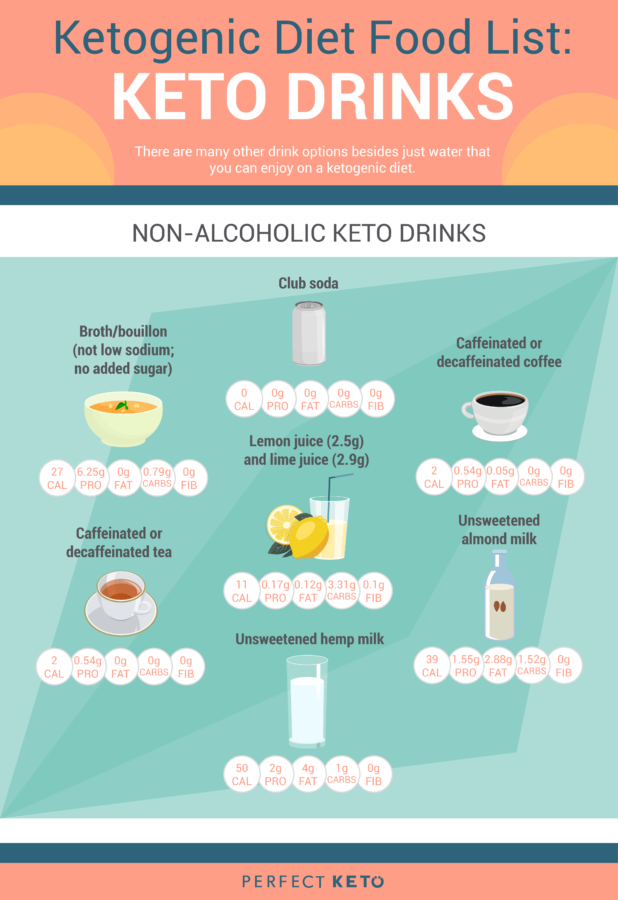
| Food | Serving Size | Calories | Protein | Fat | Total Carb | Fiber | Net Carb |
|---|---|---|---|---|---|---|---|
| Broth/bouillon (not low sodium; no added sugar) | 1 cup (235g) | 27 | 6.25 | 0g | 0.79 | 0g | 0.79 |
| Club soda | 1 can (474g) | 0 | 0g | 0g | 0g | 0g | 0g |
| Caffeinated or decaffeinated coffee | 1 cup (237g) | 2 | 0.54g | 0.05g | 0g | 0g | 0g |
| Caffeinated or decaffeinated tea | 1 cup (245g) | 2 | 0.54g | 0g | 0g | 0g | 0g |
| Lemon juice (2.5g) and lime juice (2.9g) | 1 lemon or lime (48g) | 11 | 0.17g | 0.12g | 3.31g | 0.1g | 3;21g |
| Unsweetened almond milk | 1 cup (262g) | 39 | 1.55g | 2.88g | 1.52g | 0g | 0g |
| Unsweetened hemp milk | 1 cup (236g) | 50 | 2g | 4g | 1g | 0g | 1g |
Alcohol Keto Drinks
You don't have to cut out alcohol from your keto diet, but it does come with a few caveats.
You should know:
- Alcohol contains empty calories and may cause you to overeat as your inhibitions are lowered, which can lead to weight gain.
- Alcohol also turns off your body's ability to burn fat.
- You may also get drunk faster in keto, and experience a worse hangover, since your body is not running on carbs anymore.
To help you navigate the menu better, check out the chart below to see which alcoholic drinks are the lowest in carbs and calories.
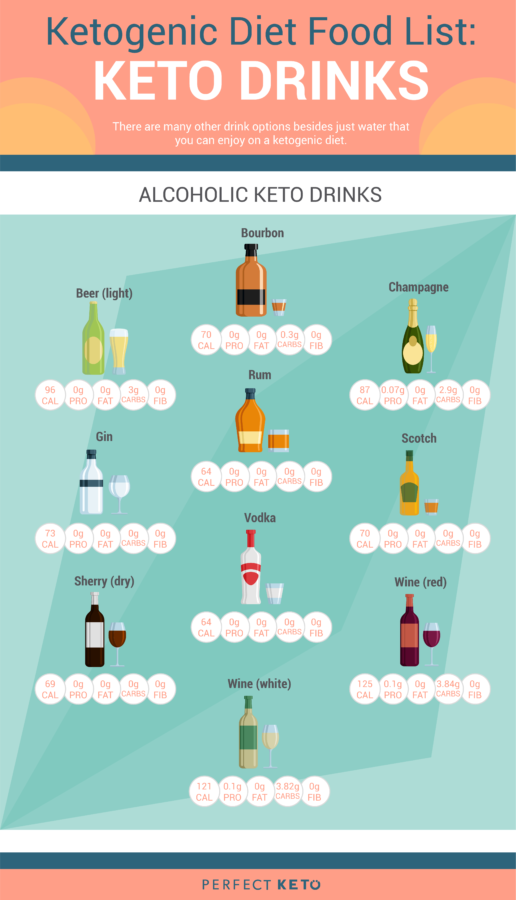
| Food | Serving Size | Calories | Protein | Fat | Total Carb | Fiber | Net Carb |
|---|---|---|---|---|---|---|---|
| Beer (light) | 12 oz. (336g) | 96 | 0g | 0g | 3g | 0g | 3g |
| Bourbon | 1 oz. (28g) | 70 | 0g | 0g | 0.03g | 0g | 0.03g |
| Champagne | 3.5oz. (100g) | 87 | 0.07g | 0g | 2.9g | 0g | 2.8g |
| Gin | 1 oz. (28g) | 73 | 0g | 0g | 0g | 0g | 0g |
| Rum | 1 oz. (28g) | 64 | 0g | 0g | 0g | 0g | 0g |
| Scotch | 1 oz. (28g) | 70 | 0g | 0g | 0g | 0g | 0g |
| Sherry (dry) | 2 oz. (57g) | 69 | 0g | 0g | 0g | 0g | 0g |
| Vodka | 1 oz. (28g) | 64 | 0g | 0g | 0g | 0g | 0g |
| Wine (red) | 5 oz. (140g) | 125 | 0.1g | 0g | 3.84g | 0g | 3.84g |
| Wine (white) | 5 oz. (140g) | 121 | 0.1g | 0g | 3.82g | 0g | 3.82g |
Alcohol to Avoid
Try to avoid these sugary adult drinks on keto:
- Cocktails and mixed drinks like mojitos, mimosas, cosmopolitans, rum and Cokes, Moscow mules, screwdrivers, gin and tonics, and Long Island iced tea.
- Frozen drinks like pina coladas, margaritas, and daiquiris.
- Beers and even non-alcoholic beers may have as much as 17-18g of carbs per drink.
- Sweet wines like riesling, moscato, sherry, and port can each have as many as 20g of carbs per glass.
For more information about alcohol on keto, check out Low-Carb Alcohol Guide: What You Need to Know About Drinking on Keto

Keto Condiments, Spices, and Dressings
Sauces contain sugar and can be a bad idea on a keto diet. That's why they're not typically on the approved keto food list. You're better off making your own sauces to control the calories, ingredients, sugars, and carbs.
Condiments and Sauces
There are also plenty of pre-made options that are safe to use if you don't have time to whip up something homemade to drizzle on your meals. Just make sure to check the nutrition facts and ingredients for sugars, carbs, and unhealthy oils or preservatives:
If you don't feel like scanning labels, you can try your hand at one of these homemade keto sauces:
- Smoky BBQ Sauce
- Perfect Keto Pizza Sauce
- Cheesy Garlic Alfredo Sauce
| Food | Serving Size | Calories | Protein | Fat | Total Carb | Fiber | Net Carb |
|---|---|---|---|---|---|---|---|
| Ancho chili pepper | 1 pepper (17g) | 48 | 2g | 1.4g | 9g | 4g | 5g |
| Anchovy paste | 1 tablespoon (15g) | 25 | 3g | 1.5g | 0g | 0g | 0g |
| Capers | 1 tablespoon (8.6g) | 2 | 0.2g | 0.07g | 0.42g | 0.3g | 0.1g |
| Chipotle en adobo | 2 peppers (30g) | 20 | 0g | 1g | 3g | 1g | 2g |
| Clam juice | 1 cup (237mL) | 78 | 15.8g | 0g | 0g | 0g | 0g |
| Coconut aminos | 1 teaspoon (5mL) | 5 | 0g | 0g | 1g | 0g | 1g |
| Coconut milk (canned and unsweetened) | 1/2 cup (113g) | 212 | 2.3g | 24g | 3g | 0g | 3g |
| Cocoa powder, unsweetened | 1 tablespoon (5.4g) | 12 | 1g | 0;74g | 3g | 0g | 3g |
| Enchilada sauce | 1/4 cup (60g) | 24 | 1g | 0g | 5g | 1g | 4g |
| Fish sauce | 1 teaspoon (5mL) | 3 | 0.66g | 0g | 0g | 0g | 0g |
| Horseradish sauce | 1 teaspoon (5.6g) | 28 | 0.6g | 2.85g | 0.56g | 0.1g | 0.4g |
| Jalapeno chili pepper | 1/2 cup; sliced (75g) | 30 | 1.4g | 0.33g | 6.6g | 1.1g | 5.5g |
| Miso paste | 1 tablespoon(18g) | 30 | 2g | 1g | 4g | 1g | 3g |
| Mustard (Dijon) | 1 teaspoon (5g) | 10 | 0g | 0g | 1g | 0g | 1g |
| Mustard (yellow) | 1 teaspoon (5g) | 3 | 0g | 0g | 0g | 0g | 0g |
| Pasilla chili pepper | 1 pepper (7g) | 24 | 0.86g | 1.11g | 3.58g | 1.9g | 1.68g |
| Pesto sauce | 1 tablespoon (15g) | 58 | 0.7g | 5.8g | 1.2g | 0.2g | 1g |
| Pickapeppa sauce | 1 teaspoon (5mL) | 5 | 0g | 0g | 1g | 0g | 1g |
| Pickle (dill or kosher) | 1/2 pickle (32.5g) | 4 | 0.11g | 0.07g | 0.73g | 0.4g | 0.3g |
| Pimento or roasted red pepper | 1 oz. (28g) | 6 | 0.3g | 0.08g | 1;41g | 0.5g | 0.9g |
| Salsa, green (no added sugar) | 1 tablespoon (10g) | 0 | 0g | 0g | 0.6g | 0g | 0.6 |
| Salsa, red (no added sugar) | 1 tablespoon (14g) | 3 | 0g | 0g | 1g | 0g | 1g |
| Serrano chili pepper | 1/2 cup (52.5g) | 17 | 0.9 | 0.23g | 3.5g | 1.9g | 1.6g |
| Soy sauce | 1 tablespoon (18g) | 11 | 1.9g | 0g | 1g | 0.1g | 0.9g |
| Sriracha | 1 teaspoon (6.5g) | 6 | 1.13g | 0.06g | 1.25g | 0.1g | 1.15g |
| Tabasco or other hot sauce | 1 teaspoon (4.7g) | 1 | 0.06g | 0.04g | 0.04g | 0g | 0.04g |
| Taco sauce | 1 tablespoon (16g) | 8 | 0g | 0g | 2g | 0g | 2g |
| Tahini (sesame paste) | 2 tablespoons (30g) | 178 | 5.2g | 16g | 6.5g | 1.5g | 5g |
| Vinegar, balsamic | 1 tablespoon (16g) | 14 | 0.08g | 0g | 2.7g | 0g | 2.7g |
| Vinegar, cider | 1 tablespoon (15g) | 3 | 0g | 0g | 0.14g | 0g | 0.14g |
| Vinegar, red wine | 1 tablespoon (15g) | 3 | 0.01g | 0g | 0.04g | 0g | 0.04g |
| Vinegar, sherry | 1 tablespoon (15g) | 5 | 0g | 0g | 2g | 0g | 2g |
| Vinegar, white wine | 1 tablespoon (15g) | 4 | 0.01g | 0g | 0.12g | 0g | 0.12g |
| Wasabi paste | 1 teaspoon (5g) | 10 | 0g | 0g | 2g | 0g | 2g |
| Worcestershire sauce | 1 tablespoon (17g) | 13 | 0g | 0g | 3.3g | 0g | 3.3g |
Dressings
Salad dressings and sauces can also have extra sugar you wouldn't expect. If you're out at a restaurant, avoid balsamics, vinaigrettes, honey mustard, and French or Thousand Island dressings since they tend to have more sugar in them. Here's a quick cheat sheet on which dressings are best whether you're home or out to eat:
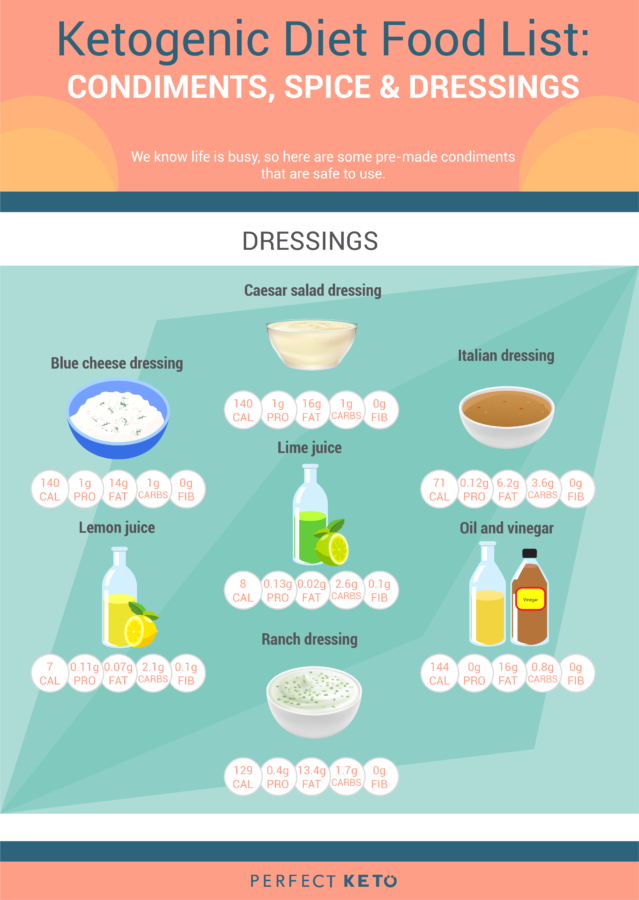
| Food | Serving Size | Calories | Protein | Fat | Total Carb | Fiber | Net Carb |
|---|---|---|---|---|---|---|---|
| Blue cheese dressing | 2 tablespoons (30g) | 140 | 1g | 14g | 1g | 0g | 1g |
| Caesar salad dressing | 2 tablespoons (30g) | 140 | 1g | 16g | 1g | 0g | 0.5g |
| Italian dressing | 2 tablespoons (30g) | 71 | 0.12g | 6.2g | 3.6g | 0g | 3.6g |
| Lemon juice | 2 tablespoons (30g) | 7 | 0.11g | 0.07g | 2.1g | 0.1g | 2g |
| Lime juice | 2 tablespoons (30g) | 8 | 0.13g | 0.02g | 2.6g | 0.1g | 2.4g |
| Oil and vinegar | 2 tablespoons (32g) | 144 | 0g | 16g | 0.8g | 0g | 0.8g |
| Ranch dressing | 2 tablespoons (30g) | 129 | 0.4g | 13.4g | 1.7g | 0g | 1.7g |
Herbs and Spices
Since many traditional seasonings and sauces aren't keto-friendly, herbs and spices will become your new best friends in the kitchen.
Just make sure they don't contain any sugars or high-carb fillers — some mixed spice blends do — and are purely the herb or spice itself before you take the spice jar home with you.
Some of the best herbs and spices to use include:
- Basil
- Oregano
- Parsley
- Rosemary
- Thyme
- Cilantro
- Cayenne pepper
- Chili powder
- Cumin
- Cinnamon
- Nutmeg
- Lemon or lime juice
- Salt and pepper
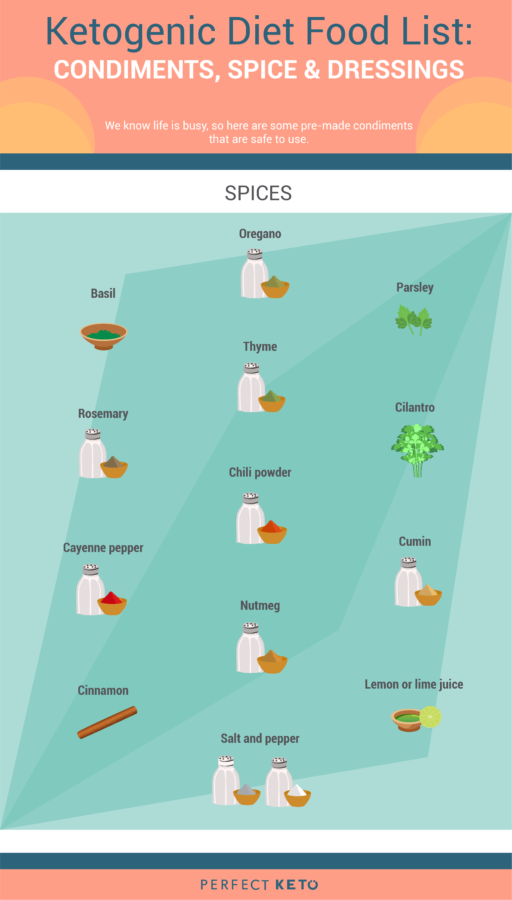
Condiments, Spices, and Dressings to Avoid
As mentioned earlier, these sauces are usually packed with sugar and should be avoided at the grocery store and anytime you eat out.
Be sure to ask your server to take them away altogether so you're not tempted and lured in by the sweet taste:
- Ketchup
- BBQ sauce
- Honey mustard
- Any packaged item containing sugar
Keto Sweeteners
When it comes to sugar, moderation and reducing your portions are not enough to keep you safe.
Over time, sugar consumption can increase your chances of developing health issues like:
- Cardiovascular disease
- Fatty liver disease
- Type 2 diabetes
- Leaky gut syndrome
This means both refined and baking sugars — even organic ones — are off-limits. For those times when you do use sweeteners in a recipe, keep these best practices in mind:
- Only use low-glycemic index sweeteners as they won't affect your blood sugar levels or contribute to your carb intake.
- Try to stay away from sweeteners that use the sugar alcohol maltitol or filler ingredients like dextrose or maltodextrin. This even applies to low- or no-calorie and low- or no-sugar sweeteners.
Two sugar alternatives that tick those boxes and are also low-carb include:
- Stevia
- Monk fruit
Here are some safe, low-glycemic sweetener options (nutrition facts may differ based on the brand you choose):
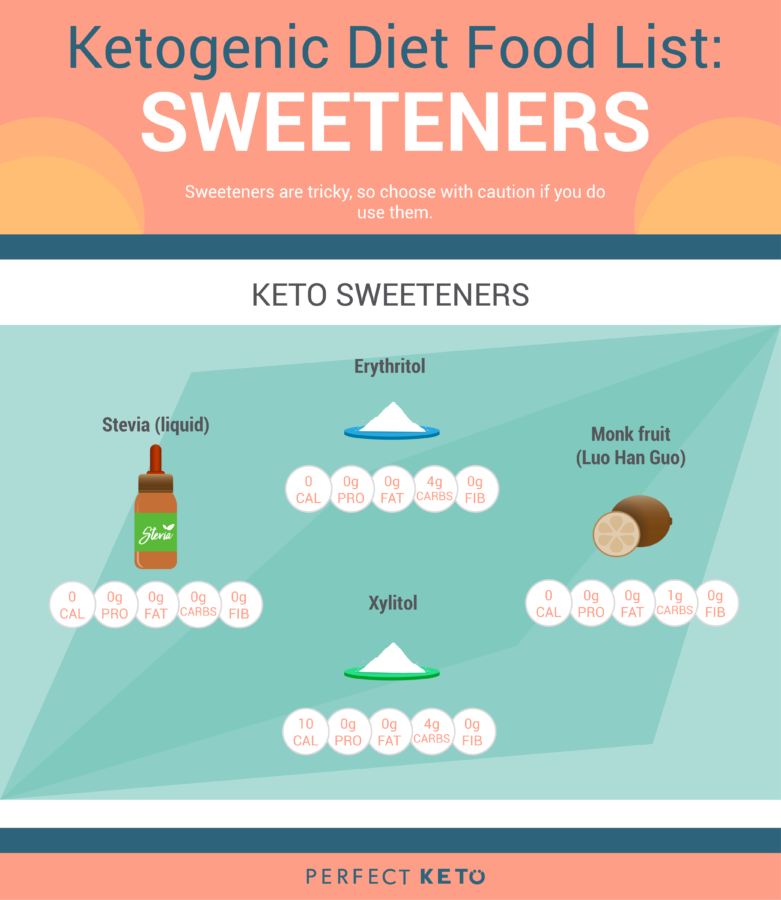
| Food | Serving Size | Calories | Protein | Fat | Total Carb | Fiber | Net Carb |
|---|---|---|---|---|---|---|---|
| Stevia (liquid) | 4 drops (0.13mL) | 0 | 0g | 0g | 0g | 0g | 0g |
| Erythritol | 1 teaspoon (4g) | 0 | 0g | 0g | 4g | 0g | 1g |
| Monk fruit (Luo Han Guo) | 1 teaspoon (0.5g) | 0 | 0g | 0g | 1g | 0g | 1g |
| Xylitol | 1 teaspoon (4g) | 10 | 0g | 0g | 4g | 0g | 1g |
Sweeteners to Avoid
Keep in mind, artificial sweeteners like Splenda, sucralose, and aspartame are also considered low calorie and low glycemic, but that doesn't make them a good option.
Some people experience blood sugar spikes and cravings when consuming these fake sweeteners. Plus they may have negative effects on your gut microbiome and can possibly cause inflammation and even weight gain over time.
If you see these ingredients on the label, the food is probably not keto-approved and shouldn't be on your keto food list:
- Any form of cane sugar
- Honey (use one of these four honey substitutes if you miss the taste or need the consistency in a recipe)
- Maple syrup
- High-fructose corn syrup
- Date syrup
- Agave syrup
For more information on acceptable keto sweeteners, check out The Top Four Sweeteners for a Low-Carb Keto Diet .

5 Beneficial Keto Supplements
Although the main focus of your ketogenic diet should be consuming whole foods that are as close to nature as possible, there are some other healthy options that will support your keto diet.
Here's a guide to some of the common supplements and other products that may help you along your keto journey.
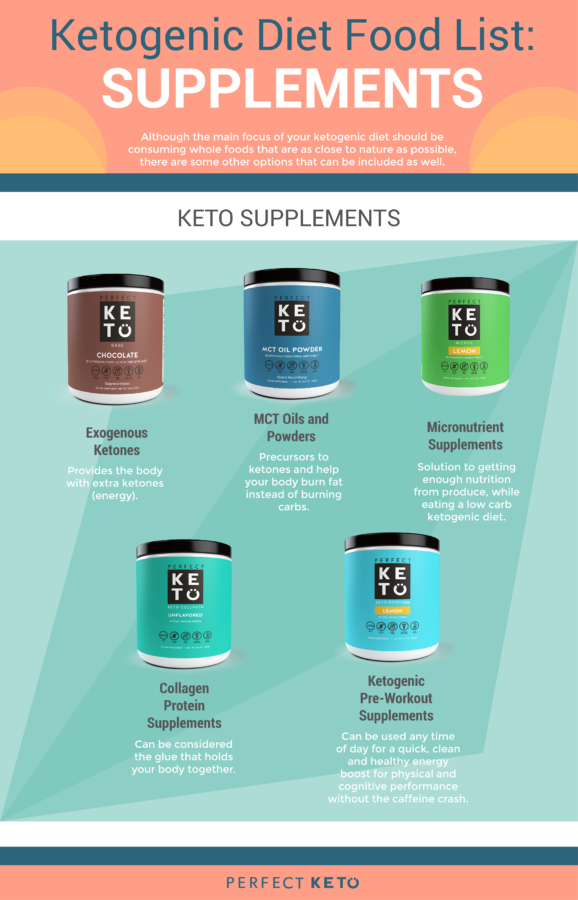
#1: Exogenous Ketones
The purpose of exogenous ketone supplements is to provide the body with extra ketones for energy. Ketone supplements can be a huge help when just starting out on keto or entering a fasted state.
Exogenous ketones help with energy levels and battle brain fog when you're getting into ketosis. They can also provide you with an extra boost of energy pre- and post-workout — even if you're already in ketosis.
Learn more about exogenous ketones here or try Perfect Keto Base .
#2: MCT Powders and Oils
MCT is short for medium-chain triglyceride. MCTs are a type of fat that are readily used for energy by your body and do not have to be shuttled around your digestive system before use. They are precursors to ketones and help your body burn fat instead of burning carbs.
Benefits of MCTs
- Weight Loss: MCTs are easily digested and have a thermogenic (energy-creating) effect, also known as boosting your metabolism.
- Energy: MCTs are a fast-acting source of energy. They break down into ketones which can then be used as fuel for your body.
- Digestion: MCTs support your gut microbiome by combating harmful bacteria, fungi, and viruses.
- Overall Health: MCTs contain antioxidant properties which reduce internal inflammation and improve overall performance of your heart, brain, and nervous system.
Learn more about MCTs and oil here or try the Perfect Keto MCT Oil Powder .
While MCTs and MCT oil play a role in fat loss, this next supplement may improve the condition of your hair, skin, nails, joints, and more.
#3: Collagen Protein Supplements
Collagen is a type of protein — one of over 10,000 in your body. Collagen is the most abundant protein in your body, accounting for 25-35% of all protein. It can be considered the glue that holds your body together.
Collagen protein from grass-fed beef is made in the same way that bone broth is made — low and slow heating to preserve the nutrition. Getting enough collagen from your diet keeps many of your organs healthy, including your skin, nails, hair, heart, eyes, joints, and muscles.
Learn more about collagen here or try Perfect Keto Collagen .
#4: Micronutrient Supplements
One of the toughest parts of sticking to the keto food list is that it cuts out lots of starchy fruits and vegetables that contain a variety of nutrients.
Perfect Keto Micro Greens can help you beat this issue by giving you the same types of nutrients you'd find in those foods without having to load up on starchy carbs and fruits to do so.
Here's what you'll find inside:
- Greens and Veggie Blend: 4.5 grams of raw and organic greens and vegetables from 12 different sources.
- Berry and Fruit Blend: 4.5 grams of raw and organic berries and fruits from 10 different sources.
- MCT Powder: 3.5 grams. We use fat from coconut oil so you absorb the vitamins, minerals, and nutrients in plants.
- Liver Support and Digestive Enzymes: These help you absorb all the nutrients in the product.
Learn more about micronutrients here or try Perfect Keto Micro Greens Powder .
#5: Ketogenic Pre-workout Supplements
As discussed in this guide, it's not just the carbs, calories, and sugar content you have to consider when choosing workout supplements, especially pre-workouts.
Many pre-workout powders contain cheap fillers, chemical binders, and artificial ingredients which have been linked to:
- Weakening of your immune system
- Impaired neuromuscular transmission
- Increased asthma attacks, allergic reactions, and migraines
- IBS and leaky gut syndrome symptoms
- Ovarian, lung, and endometrial cancers
Even if the pre-workout you're considering is promoted as low-carb and sugar-free, you can't trust it until you do your own research to see what's really behind the claims.
Fortunately, you don't have to go far with this low-carb pre-workout free of junk fillers and chemical ingredients.
Here's a peek inside the Perfect Keto Perform Pre-Workout:
- 7.7g BHB ketones: Boosts ketones through its work with acetyl groups to create ATP, the energy currency of cells.
- 5g MCTs: Provides healthy fats and a source of ketones for an energy and cognitive boost.
- 2g Creatine: Increases your body's ability to produce energy fast through cellular hydration.
- 2g BCAA (2:1:1): Branched chain amino acids composed of leucine, isoleucine and valine. Together, they promote muscle protein synthesis and cellular glucose uptake for muscle growth and better endurance.
- 1.5g Beta-Alanine: Promotes muscle endurance and more power output during training.
- 500mg L-citrulline: Helps reduce muscle soreness and promotes better endurance for your workouts.
- 50mg Caffeine: Derived from green tea, it promotes alertness without the blood pressure and heart rate elevation caused by caffeine.
Learn more about exercising on keto or try Keto Perform Pre-Workout.

Vegan Options
Many people question whether or not it's possible to follow a ketogenic diet while being a vegan. Although difficult (and not recommended), it's not impossible to become a keto vegan.
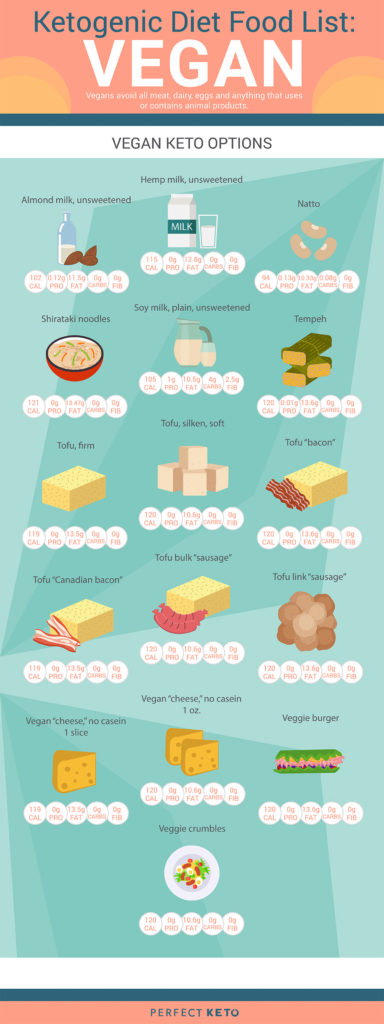
Vegan Keto Tips
If you plan to follow a vegan or vegetarian style of keto, be sure to keep these tips in mind:
- The biggest issue many face when trying this style of keto is unknowingly eating too many carbs from vegetables and not enough dietary fat.
- Avoid pastas, breads, chips, tortillas, rice, starch, white and sweet potatoes, fruit juices, sodas, and cereal.
- Stick with spinach, kale, collard greens, asparagus, cucumber, Brussels sprouts, broccoli, cauliflower, bell peppers, and the other vegetables mentioned earlier in this guide.
- Enjoy berries as your primary fruits, occasionally.
- Good sources of protein include eggs, dairy, tempeh, natto, miso, nuts, and seeds (which are also great fat sources too).
- Whether you're vegan or vegetarian, these fats are ideal: olive oil, avocado oil, coconut oil, MCTs, macadamia oil, olives, avocado, cocoa butter, and organic dairy options.
- Avoid pre-packaged vegan options as many are filled with fillers and soy, which, just like tofu, may not be right for some.
While tofu is an option, there are limitations to consider since it contains xenoestrogens and phytoestrogens which can actually trigger your body to stop making its own estrogen. For some, this means processed tofu is not something you want to consume a lot of.
To learn more about this controversial food and to see if it's OK for you, check out this guide when you're finished here. You can also find a complete list of vegan and vegetarian foods that are safe on a ketogenic diet below:
GET MORE KETO-FRIENDLY RECOMMENDATIONS
Subscribe to the Perfect Keto weekly newsletter to get easy & insanely delicious keto recipes, keto guides & the latest keto trends right in your inbox.
You're in!
Vegan Keto Options
| Food | Serving Size | Calories | Protein | Fat | Total Carb | Fiber | Net Carb |
|---|---|---|---|---|---|---|---|
| Almond milk, unsweetened | 1 cup (240 mL) | 29 | 1g | 3g | 2g | 1g | 1g |
| Hemp milk, unsweetened | 1 cup (236 mL) | 50 | 2g | 4g | 1g | 0g | 1g |
| Natto | 1/4 cup (44g) | 92 | 8.5g | 5g | 5.5g | 2.5g | 3g |
| Shirataki noodles | 4 oz. (113g) | 20 | 1g | 0.5g | 2g | 2g | 0g |
| Soy milk, plain, unsweetened | 1 cup (240 mL) | 79 | 7g | 4g | 4g | 1g | 3g |
| Tempeh | 1/2 cup (83g) | 159 | 17g | 9g | 6g | 0g | 6g |
| Tofu, firm | 4 oz. (113g) | 70 | 8g | 3g | 3g | 0g | 3g |
| Tofu silken, soft | 4 oz. (113g) | 62 | 5.5g | 3g | 3.3g | 0g | 3.3g |
| Tofu bacon | 2 strips (20g) | 40 | 4g | 2g | 0.53g | 0.3g | 0.23g |
| Tofu Canadian bacon | 3 slices (57g) | 70 | 14g | 0.5g | 2.g | 0.5g | 1.5g |
| Tofu bulk sausage | 2 oz. (57g) | 60 | 7g | 0g | 7g | 3g | 4g |
| Tofu link sausage | 2 links (64g) | 130 | 9g | 4g | 15g | 3g | 12g |
| Vegan cheese (no casein) | 1 slice (19g) | 35 | 1g | 2g | 5g | 0g | 5g |
| Vegan cheese (no casein) | 1 oz. (28g) | 70 | 1g | 7g | 2g | 1g | 1g |
| Veggie burger | 1 burger (70g) | 124 | 11g | 4.4g | 10g | 3.5g | 6.5g |
| Veggie crumbles | 3/4 cup (55g) | 80 | 8g | 1;5g | 9g | 1g | 8g |
Source: https://perfectketo.com/full-ketogenic-diet-food-list/

